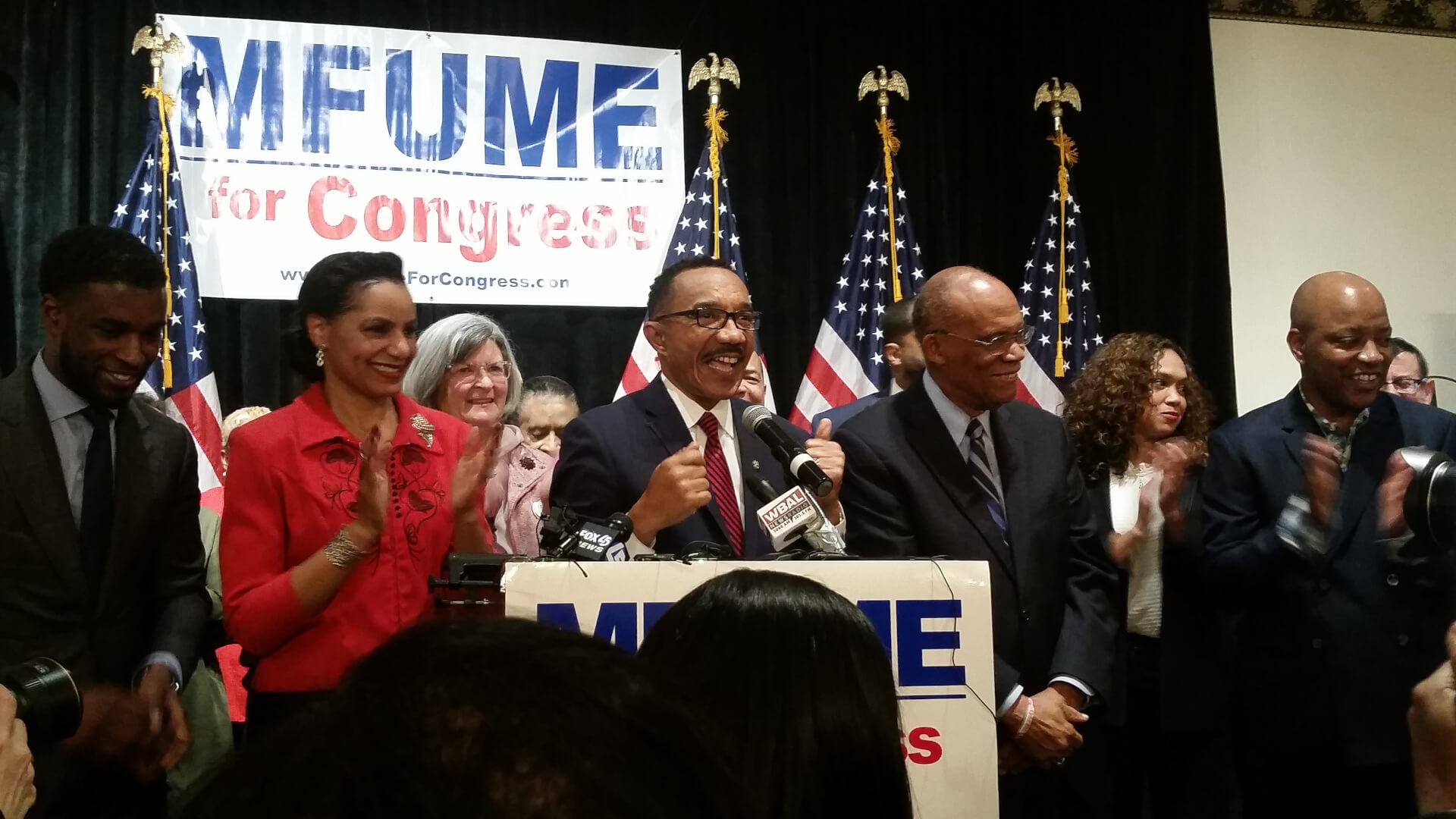What’s at Stake in the Special Election: ‘We’re Going to Learn a Lot’

Officially, the special congressional election in Maryland’s 7th District Tuesday pits former Rep. Kweisi Mfume (D) against conservative commentator Kimberly Klacik (R) for the right to finish the term of the late Rep. Elijah E. Cummings (D).
But with the outcome likely a foregone conclusion in a heavily black and historically Democratic district, the real question about Tuesday’s election is how state elections officials handle voting that is done almost entirely by mail — and what that portends for the state’s June 2 primary, which will also largely be a vote-by-mail affair.
The special election will also test the ability of candidates and pro-democracy groups to turn out voters in the midst of a pandemic — by convincing them to embrace a method of voting that they may not be familiar or comfortable with.
“I do think we’re going to learn a lot,” said state Del. Brooke E. Lierman (D-Baltimore City), who hosted a webinar with voting rights experts Monday called “Voting During COVID-19.”
State elections officials mailed out about half a million ballots to registered voters in the 7th District a few weeks ago. Voters need only put the return envelopes, which do not require stamps, in the mail for their vote to be counted — so long as the envelope is postmarked by Tuesday.
Each of the three jurisdictions in the 7th District — Baltimore City and Baltimore and Howard counties — will open one polling place, where voters can cast their ballots in person, though they have been set up mostly to accommodate people with disabilities or who are otherwise unable to vote by mail. Voters can also drop off their mail-in ballots at the three jurisdictions’ local elections office, to ensure that their votes are tabulated.
With the COVID-19 outbreak in Maryland nowhere near abating, voting rights groups are advising voters to take advantage of the mail-in ballot — though they concede that that message is especially tough to deliver in the 7th District, whose current contours were roughly created after the passage of the Voting Rights Act. Black voters who came of age during the civil rights era are often inclined to want to vote in person due to the very symbolism of the act, said Nykidra Robinson, founder of the advocacy group Black Girls Vote.
“We don’t want people to choose their health over democracy,” she said.
Several Baltimore-area groups are working to spread the word that the way for voters to make their voices heard — in the race to fill Cummings’ seat, which has gone vacant for half a year, and again in the upcoming primary — is to vote by mail.
The group Baltimore Votes has organized online training sessions about voting-by-mail and shared them with other community organizations.
“It’s amazing how quickly folks have adapted,” Sam Novey, the director of Baltimore Votes, said in an interview. “We’ve seen huge demand for our trainings.”
Baltimore Votes has also cut radio and TV ads in recent days reminding people to vote by mail. A 30-second TV spot features Maryland House Speaker Adrienne A. Jones (D-Baltimore County), University of Baltimore President — and former mayor — Kurt L. Schmoke, and former Republican National Committee Chairman Michael Steele, and a 30-second radio spot is narrated by retired U.S. Sen. Barbara A. Mikulski (D).
Both ads open with tributes to Cummings: “For 23 years, Representative Elijah Cummings fought tirelessly for Maryland’s 7th congressional district,” Jones and Mikulski say at the top of the spots.
“Now, more than ever, your vote is critical,” Jones adds.
“Be safe. Stay home. And fill out the ballot,” Mikulski exhorts.
The candidates themselves have also been trying to reach voters: Mfume through a tried and true network of ministers, seasoned political leaders, and community groups with whom he’s worked for more than four decades; Klacik largely through social media.
Mfume’s campaign website features a pop-up of a mailbox on the home page, with information on how to vote by mail. The top of Klacik’s web page also reminds voters to “mail in ballots by April 28th,” along with a campaign slogan just underneath: “I am the future! The past is the past.”
That’s a not-so-subtle reference to the age difference between the candidates — Klacik is 38, Mfume is 71 — and to the fact that Mfume, who is making his political experience a key selling point in the campaign, last served in Congress two dozen years ago.
“We could win this if everyone truly cared,” Klacik tweeted Tuesday morning.
But the numbers do not look good for the Republicans, given the overwhelming Democratic registration advantage in the district. Of the 483,635 special elections ballots that went out by mail to 7th District voters, 327,868 went to Democrats. Through Thursday, Democratic voters had returned 50,743 ballots, Republicans had mailed back 17,659 ballots, and nonaffiliated voters or members of third parties had sent in 9,023 ballots.
Because ballots will still be arriving at elections offices for the next several days, a final vote tally will not be available until all the ballots are counted. Anyone who turns up at the three polling places and wants to take advantage of the state’s same-day voter registration will be provided a regular ballot — unless elections officials have questions about the information they are providing or don’t find their address in a database, in which case, they will be given a provisional ballot.
The state Board of Elections is expected to release results of the ballots that have been counted so far shortly after the polls close at 8 p.m. It’s possible that the Associated Press or other media outlets may call the race on Tuesday night even without the final results, if the margin between the candidates is wide.
Mfume plans to address socially-distanced supporters at his campaign headquarters in downtown Baltimore around 9:15 p.m. Tuesday. Klacik informed supporters on Twitter Tuesday morning that she’ll be communicating with voters via her social media accounts all day to provide “Election Day coverage minus the #FakeNews.”
Voter turnout is hard to predict and already there are scattered, anecdotal accounts of voters who never received ballots. How many of those individuals will want to vote in person in the midst of the COVID-19 pandemic is anyone’s guess.
The states that have widely used mail-in voting over a period of time — Colorado, Hawaii, Oregon, Washington and Utah — have seen a clear uptick in voter participation. But a report released Monday by the liberal Center for American Progress suggested that most states are ill-equipped to make the adjustments necessary to adopt vote-by-mail in the face of the pandemic.
In the report, Maryland was praised for being among several states that already worked to make it easier to vote by mail even before the outbreak of COVID-19 — in Maryland’s case, by enabling voters to obtain an absentee ballot without an explanation. But the report noted that vote-by-mail in Maryland has traditionally been underutilized — until this special election.
Still, advocates in Maryland are cautiously optimistic about the outcome — and about their ability to take what they’ve learned from the special election and apply it to the June 2 primary and, if necessary, to the November general election.
“I think we’re going to be OK,” said the Rev. Kobi Little, president of the Baltimore City NAACP, “and I think in June we’re going to be able to increase our voter participation.”
A NOTE TO OUR READERS
In these uncertain times, we’re here for you. We have a page dedicated to our reporting on COVID-19 in Maryland. We’ll continue to report with an eye toward the humanity of our sources and a commitment to public accountability.
Stay informed by signing up for the Maryland Matters Memo — our daily morning news roundup, delivered to your inbox. Free.
And if you are able, please consider a tax-deductible contribution to support our nonprofit newsroom.
We’re burning the candle at both ends — doing all we can to keep ourselves, and everyone else, as safe as possible — as we keep you informed.
Please take care!




 Creative Commons Attribution
Creative Commons Attribution